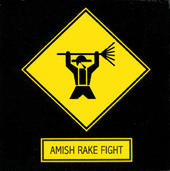Mike Fisher's involvement with electronic music began with his role as keyboardist and founding member of Machines of Loving Grace in 1989. Machines' first eponymous album enjoyed success on college radio, and their second album "Concentration" expanded their audience, with the single "Butterfly Wings" becoming a staple of then-trendsetting stations like KROQ in Los Angeles. 1994 brought the band's inclusion in the soundtrack to "The Crow" motion picture, with the track "Golgotha Tenement Blues". Machines' final album "Gilt" was released in 1995. During their tenure Machines released three albums, countless singles, and toured extensively with a variety of artists including Peter Murphy, My Life with the Thrill Kill Kult, The Swans, Surgery, and Stabbing Westward.
Fisher's involvement with so-called "industrial" music belies his background as a classical cellist. Amish Rake Fight, however, moves in a different direction. The first ARF album "Fellow Prisoners" is cool and thoughtful, elegant and complicated. Preferring attention to detail over prolific output, and melody over repetition, the Amish Rake Fight sound reveals a fine, even maniacal interest in small details and thematic subtleties. "Fellow Prisoners" winds percussion from the exotic East and Africa, samples from obscure films, and twisting string sections. Hence, Amish Rake Fight is music that often demands more than one listen -- each subsequent examination reveals new details and layers.
"Fellow Prisoners" is the product of Fisher's desire to re-explore working alone - and learning to work with one's own worst critic. It's a story that began with the track "Sir Wellington du Beuf" in 2000 and continued through the summer of 2002, culminating in mix sessions at Radio Star Studios in Weed, California with veteran producer Sylvia Massy Shivy (Tool, Machines of Loving Grace) and engineer Rich Veltrop (Tom Petty, Rage Against the Machine).
A confessed analog synthesizer junkie, Fisher draws upon a broad palette of sounds in the creation of Amish Rake Fight. The ambient, evocative textures of "Fellow Prisoners" were realized with a mix of old and new - from rare vintage synthesizers to the occasional electric guitar.
